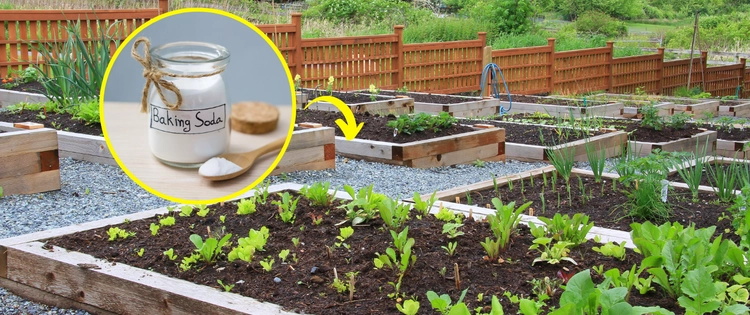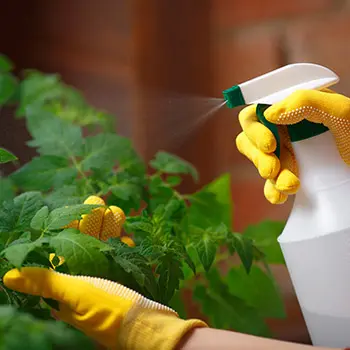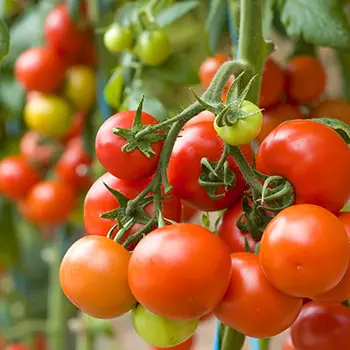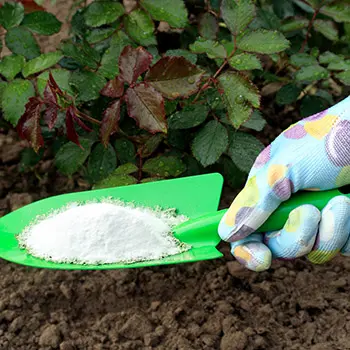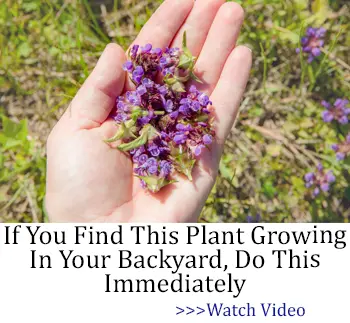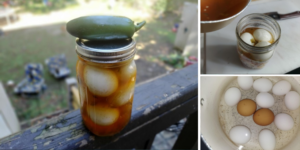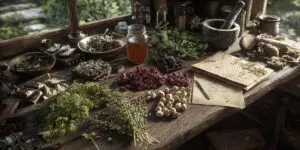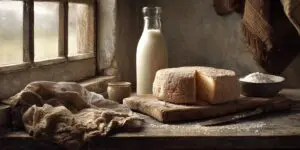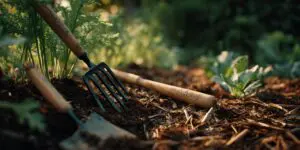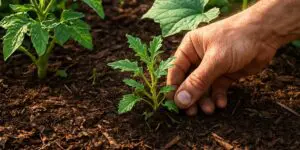Baking soda in your garden? Yes, you can use baking soda for many things in the garden. There are also times when you shouldn’t use baking soda. We will explore both.
Baking soda is the common term for sodium bicarbonate, a natural salt used in baking, cleaning, and odor elimination. Its gritty properties make it a great scouring agent, and its slightly alkaline (opposite of acidic) properties allow it to be used for other things.
Let’s take a look!
Ways to Use Baking Soda in Your Garden
Repel or Kill Pests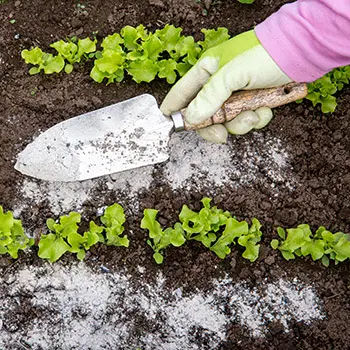
Sprinkle baking soda in a border around your plants (but not on them) to keep slugs, ants, silverfish, cockroaches, and other pests out. They don’t like the baking soda and won’t cross it.
You can also kill slugs by sprinkling it directly on them. To destroy ant mounds, sprinkle a couple of cups of baking soda on the mound. Follow this with 1 cup of vinegar. This will kill most ant mounds, although you may need a follow-up treatment to eliminate it completely.
Related: Easy DIY Garden Pest Killer You Can Make At Home
Kills Weeds
You can sprinkle baking soda directly on weeds to kill them; apply it to their entire surface. This works excellent for weeds that like to grow in cement cracks, making them difficult to remove. You can even use this on crabgrass: water it, then generously sprinkle baking soda on top, and in a few days, it will die.
Eventually, the baking soda will wash away, and new weeds will grow in its place, so you may need to treat it again. You also don’t want to do this right next to your garden plants since it could kill them, too; newspaper and mulch are safer weed control methods for that.
Treat and Prevent Fungal Infections
Baking soda is an excellent home remedy for treating fungal diseases like powdery mildew, black spots, blight, and leaf scabs, which thrive in humid environments. Mix about 1 tsp of baking soda and a few drops of liquid dish soap in a quart of water. Mix it well and use it in a sprayer to treat the infected areas and prevent new spots from appearing. For blight, use it on your tomatoes as a preventative treatment.
Baking soda increases the pH (decreases acidity) and makes it less hospitable to fungal spores. This will treat some fungi but is more preventative for most types. It is best to remove badly infected leaves and then treat the rest so that they will grow healthy without the fungus.
However, don’t use it in hot, sunny weather, or you may burn your leaves.
Cleaning
Baking soda is a fantastic all-purpose, all-natural garden cleaner. Use it to scrub stubborn residues from plastic plant pots, potting benches, plastic or wooden garden furniture, statues, and birth baths. It can also clean and eliminate odors in garbage cans, garden bins, and compost containers. Simply wet your cloth, sprinkle on the baking soda, and scrub it clean. Then, rinse it with plenty of water to remove the residue.
You can also use it to remove stubborn salt deposits from clay pots by making a thick paste with baking soda and water. Then, rub the paste onto the pots and let it sit for 20 minutes. Next, give it a quick but thorough scrub and rinse very well.
It also works great to clean your dirty garden hands, providing scouring action to remove those stubborn residues.
Sweeten Tomatoes
Tomatoes will taste sweeter if they are not grown in too acidic soil. If your soil is highly acidic (has a low pH), you can remedy this by sprinkling a little bit of baking soda around the base of your plants, raising the pH and making them sweeter.
This also will help protect your tomatoes from blight if you live in a humid environment. However, don’t use this if your soil is neutral or alkaline; only use it in acidic soils, and don’t treat them more than twice during their growth cycle.
Related: 10 Tomato Growing Tips For Beginners
Treating Poison Ivy and Sunburn
If you get poison ivy or sunburn while working in the garden, apply a paste of baking soda and water to relieve the itch and soothe the burn. You can also add ½ cup to your bath after a long day in the garden to soothe your body and any itching or burning at the same time.
When Not To Use Baking Soda
Excess Baking Soda Can Harm Your Plants
Since baking soda is a salt, it should never be used excessively around your plants, or it can dry them out, causing wilting and stunted growth, and could eventually kill them. Baking soda also increases the pH of the soil, making it more alkaline and less acidic.
This can be beneficial if you have overly acidic soil. However, you should use it very sparingly if your soil is already too alkaline, or you will make it worse.
Discourage Fungal Infections Rather Than Relying on Baking Soda
While using baking soda to treat and prevent fungal infections is a fantastic idea, you shouldn’t only rely on it because too much can harm your plants. Fungal infections are caused by three things: the presence of the fungus, plants that are susceptible to the fungus, and environmental conditions that allow them to thrive. Apart from choosing resistant cultivars, the environment is another factor you can control.
Moisture and poor circulation are the two environmental conditions that create most fungal infections. Change your watering practices, improve soil drainage, and reduce planting density or do other things to improve air circulation, and you will have fewer fungal infections.
Don’t Use Baking Soda in Your Compost
Some people suggest using baking soda as a compost odor eliminator, but this terrible idea can actually make it worse. Adding it to your compost will harm the organisms that break it down, slowing the process and increasing the odors.
If your compost is smelly, you likely aren’t using the correct dry-to-wet or carbon-nitrogen ratios. Adjust your inputs, and you won’t need to control the odors.
Baking Soda Corrodes Many Metals
Baking soda can corrode or rust many metals, although it is perfectly safe for stainless steel. On other metals, like cast iron, it can scour the protective surface, causing it to rust. It should also never be used on aluminum, copper, or silver, or it will cause corrosion and discoloration.
If necessary, you can use baking soda to scrub stubborn residues from garden tools. However, rinse the tool with plenty of water afterward and dry it thoroughly to prevent rusting.
It Does Not Keep Cut Flowers Fresh
Some people believe using baking soda in your vase will keep flowers fresh. However, acidic water is best for cut flowers, and since baking soda raises pH, this becomes counterproductive. While it will help with some fungal infections and may keep the water clearer, it is unlikely to actually extend the life of your cut flowers.
You may also like:
If You See This Plant in Your Backyard, Burn It Immediately! (Video)

